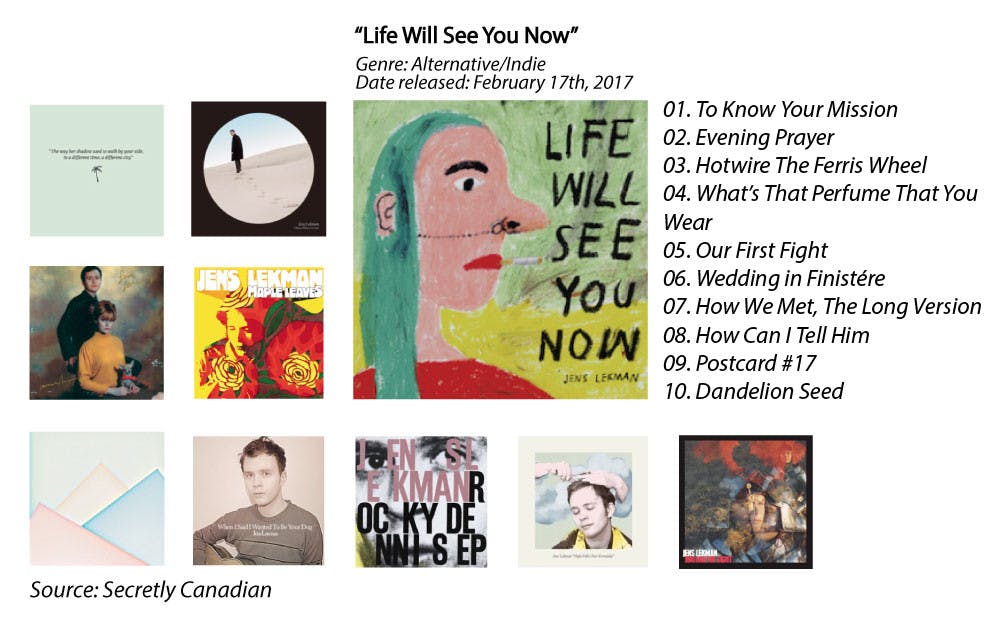Swedish singer-songwriter Jens Lekman’s 2015 New Year’s resolution was daunting: He wanted to pen 52 songs — one for every week of the year. The project — officially titled “52 Postcards” — would have been a herculean undertaking for almost any musician, but Lekman pulled it off with aplomb. Few of Lekman’s “postcards” forsake quality for quantity, chronicling broken hearts and national crises through the lens of heartfelt and observational lyricism.
But the limit-defying artist responsible for “52 Postcards” must have experienced a degree of apprehension. Indeed, the track “Postcard #17” speaks to Lekman’s anxious mentality throughout the project. In a stroke of self-reflection, Lekman documents the creative instability inhibiting his writing, singing that he must “trick [him]self into pouring it all out.” Crippling self-doubt is something of a tired trope for the tortured artists of the world, but Lekman, independent music’s spokesman for dejection, opines on working through it with refreshing clarity and sincerity. On “Postcard #17,” Lekman depicts himself climbing out of a hole of insecurities, but at no point does the track ever feel forced or mired in overwrought sentimentality.
“Postcard #17” reappears on Lekman’s newly released 2017 LP “Life Will See You Now,” an album that embodies this dark, emotionally fraught dimension of Lekman’s persona. Hints of his sorrow surface in 2012’s “I Know What Love Isn’t,” but the depression begins to manifest itself wholly in “Life Will See You Now.” Joining “Postcard #17” in its despondency, other songs on the album detail an ex-lover’s perfume (lead single “What’s That Perfume That You Wear?”) and an ailing friend’s tumor (the LouLou Lamotte-featuring “Evening Prayer”), presenting the listener with a humanizing and crestfallen Lekman.
But at no point does the despondency of the album preclude an enjoyable and engaging experience for the listener. Unlike so many tortured artists, who tend toward shrouding their depression in innumerable layers of irony, Lekman sings of his foibles with an endearing earnestness. Unwilling to veil their emotion with cynical self-consciousness, the songs play out like sincere documents of the mundane encounters one might have with a woeful friend at a bar, distancing the album from much of contemporary indie music. Closing track “Dandelion Seed” perhaps best embodies this sincerity as a rainstorm-set rumination on Lekman’s emotional distance from his loved ones. With “Dandelion Seed,” Lekman directly — and honestly — addresses an old friend about his own mounting insecurities. He lends a believable, anecdotal quality to the song by name-dropping locales within his native Gothenburg.
Lekman capably describes day-to-day bouts of misery with these mundane vignettes, portraying quotidian experiences at bus stops and cathedrals with an arresting, transcendent heartache. His capacity for poignantly capturing trivialities with an air of melancholy and admiration remains his most exceptional quality as a singer-songwriter. His songs are only made more remarkable by the fact that Lekman’s native language is not English.
The album’s score, replete with rich and upbeat tones, belies its pervading melancholy. Vibrant horns lifted from 80’s synthpop are paired with ebullient backing vocals from artists LouLou Lamotte and Tracey Thorn, providing a sound that would not be out of place on a Jackson 5 record. These elements offer a little levity to Lekman’s despair and grant the impossible-to-hate singer-songwriter a much-needed silver lining.
Some critics might describe “Life Will See You Now” as post-ironic, full of a welcome sincerity that trumps an all-too frustrating irony. But that is probably too pretentious a phrase for Lekman, who describes how he simply aspires to be a social worker “just like his dad.” This lyric might be the record’s defining moment, a perfect display of the true and unaffected elements that make Lekman and his music so endearing to listeners.





